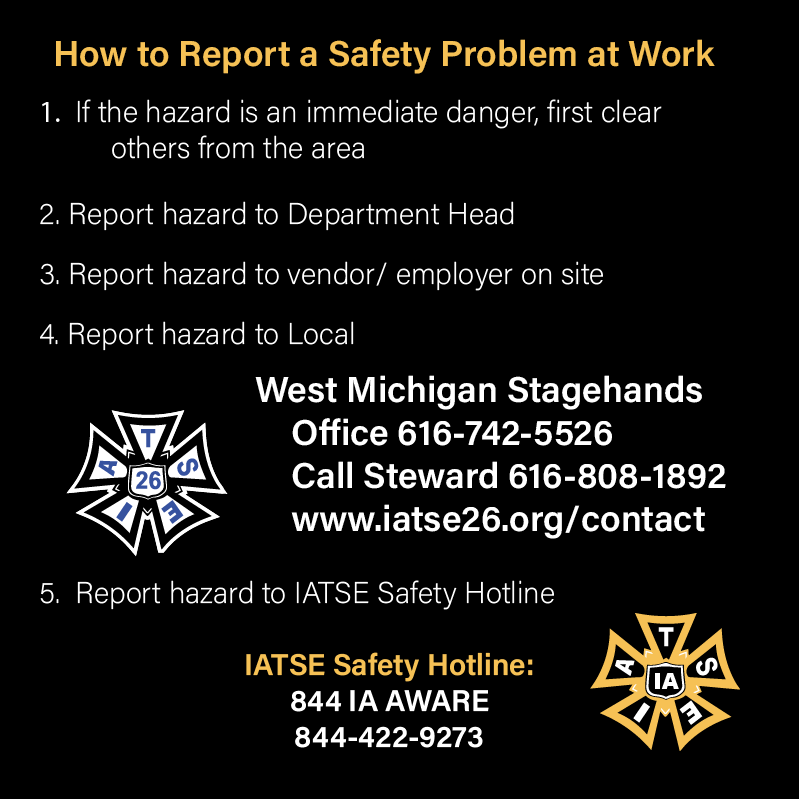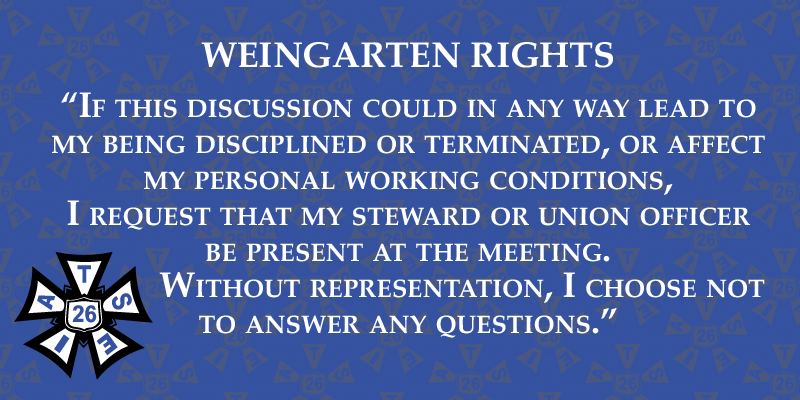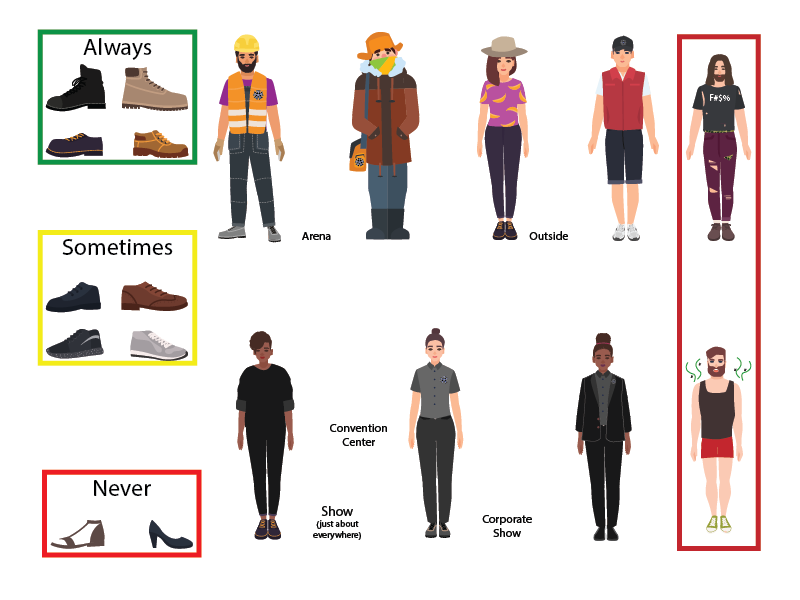Workplace Behavior
Important message for all members and referents:
We cannot stress enough how important it is for every member and referent to read and adhere to the message below. While this may come as “new” information to some, it has always been in place and will continue to be in place.
Everyone should be treated with respect and professionalism.
You should refer to someone by name, title, or stated pronoun.
From time-to-time physical contact with another worker will happen given our jobs however everyone should feel comfortable and safe at our workplace. Using unnecessary force or purposefully continuing to touch someone after they have told you to stop is considered harassment regardless of your intent. No means no.
You have the freedom of speech not the freedom from consequences.
Local 26 does not tolerate retaliation for complaints and if you are found guilty of retaliation you could be barred from the local.
The employer may take their own action in all workplace rules/laws. We will always represent our members and referents to make sure all punishments are fair, for just cause, and proportionate to the offense.
If you have any question as to if any actions could violate the above guidelines, please reach out to any department head/steward, the employer, the local’s office, the executive board, or the international at the soonest time you feel safe to speak to someone about it. If you need to remove yourself from the situation to feel safe do so, but do not leave the job site.
Local 26 is taking steps to stop sexual harassment in the workplace.
If you feel unsafe in our workplace because of the actions of an individual, please do not hesitate to reach out to the Department Heads, the Employer, Executive Board or the IATSE’s Hotline 844-422-9273. If you have travelled outside of our jurisdiction to work for another Local, the hotline or the IATSE Safety app can connect you with the leadership of that jurisdiction. It is available through the Apple and Android.
We want every referent and member to have a safe place to work.

IATSE Local 26’s nondiscrimination and misconduct policies apply to all members, referents, probationary referents, and office staff. Stagehands refers to this collective group. We cannot stress enough how important it is for everyone to feel safe, respected, and protected by Local 26.
Misconduct will not be tolerated be it from a stagehand, Employer, Vendor, or anyone else on the jobsite. Local 26 will not tolerate retaliation against anyone who, in good faith, reports or provides information about suspected misconduct.
Any stagehand who retaliates against anyone involved in an investigation will be subjected to disciplinary action, up to and including removal from the Referral List.
Sexual Harassment, Discrimination, and Misconduct should be reported as the safety issues that they are.
The following is a list of FAQ. We will do our best to update as more questions arise.
IATSE Local 26 Referral Procedure Article 9 Section 1
9. Misconduct. Any person who engages in gross misconduct, extreme misbehavior, creates a disturbance, or engages in disorderly, abusive, or threatening conduct at the referral hall, online, or at a worksite or who intentionally interferes with or disrupts the administration of the referral procedure will be subject, at the discretion of the Union’s Business Agent, to a suspension from the referral list until the Executive Board can decide on disciplinary action. The department head or duly appointed union representative at the venue where the misconduct occurs will file a written report to the Executive Board detailing the misconduct or misbehavior. This report will include names and contact information of any witnesses, participants, and/or affected individuals.
11. There shall be no discrimination by the Union or any of its members against any referent because of their race, sex, age, disability, color, national origin, religion, creed, genetic information, sexual orientation, gender identity, gender expression, veteran status, or any other protected class or on the basis of Union membership or non- membership (as long as Federal or State Right to Work laws exist), or placement on the Referral List.
Whose side are you on?
The side of good. The main purpose of a union is to protect the workers. We strive to protect the targets of abuse and harassment. We also try to help rehabilitate and educate people that have done something wrong but wish to make up for it.
Local 26 has a duty or fair representation. We do our best to defend the person even when we cannot defend the action. That does not mean we tolerate bad behavior. It means that we investigate thoroughly, practice progressive discipline, and encourage education as part of the rehabilitation process. All disciplinary actions must have just cause and be proportional to the misconduct.
Any Employer that chooses to take action against anyone under our protection will be held to those same standards.
Will my name be released when I file a complaint?
No. Not unless you give us permission.
Best case scenario there will be witnesses, a camera, or situation where we can site a third party could have seen the incident. If we begin to investigate and are unable to proceed without risking the bad actor realizing who filed the complaint, we will stop and discuss it with you before we proceed.
There are times when you will have to choose between staying anonymous and action being taken. We will never decide for you. We will support you.
Who do I report Misconduct to?
Follow the same steps you would use to report any other safety issue.
- If in immediate danger, first clear the area
- Report to the Department Head
- Report to the Employer/Vendor on site
- Report to the Local
West Michigan Stagehands
Office 616-742-5526
Call Steward 616-808-1892
- Report to IATSE Safety Hotline
IATSE Safety Hotline:
844 IA AWARE
844-422-9273
If you have travelled outside of our jurisdiction to work for another Local, the hotline or the IATSE Safety app can connect you with the leadership of that jurisdiction. It is available through the Apple and Android.
DO NOT LEAVE THE JOBSITE without permission from the employer. Labor law is clear, you cannot be punished for refusing to do something unsafe. Step to the side and start up the chain of command.
Walking off a call is a 30-day suspension according to our referral procedure.
Article 7
- Leaving Early. Should a referent need to be replaced on a call while on site, the referent will notify their department head or steward who will make necessary arrangements with the call steward for a suitable replacement. If a referent fails to obtain approval from the employer for an early departure from a call, the referent will be suspended from the referral list for thirty (30) days for each occurrence.
I’m not sure it was ________. Who can a I talk to about the situation?
The Business Agent handles the day to day issues of the Local. If you are more comfortable with another member of the Executive Board, we are here for you. The Local’s Office Staff (616-742-5526) and the Call Stewards (616-808-1892) have contact information for everyone on the Board or you can drop us a line on the Contact page. https://www.iatse26.org/contact/
Tyler Blackport is our Member-At-Large, his duty is to represent the interests of the members (and referents) of the Local. If you are unsure if you want to pursue action, he is a good resource to talk it out. The Member-At-Large email is MAL@iatse26.org.
You do not have to reveal to the anyone why you would like to speak to someone on the Board, but please do relay if it is time sensitive so the Office Staff/Call Steward can give you options if any individual is unable to respond right away.
What needs to be in the report?
Local 26 is not the Employer and is limited in our actions. We must have complaints in writing. We will help you write out a report or take notes and have you sign it. The basic facts we need are:
When – The date and at least a rough idea of time
Where – On the Job, Online, which Event
Who – Who was involved? Who could have witnessed it?
What – What happened? What was said?
I’m new at being in a Leadership role, HELP!
CALL FOR REINFORCEMENTS!
Whether you are first time department head or you just feel out of your depth, remember that we are in this together. You do not have to wait for everything to go wrong before you ask for help. We are available by call, text, and email. Specify if it is time sensitive.
This applies to someone making a report to you as well as someone asking you to represent them.
The Local’s Office Staff (616-742-5516) and the Call Stewards (616-808-1892) have contact information for everyone on the Board or you can drop us a line on the Contact page. https://www.iatse26.org/contact/
I was accused of _____. What do I do?
Keep calm.
Invoke your Weingarten Rights!

Local 26 does it’s best to defend the person even when we can’t defend the action.
We take our duty of representation seriously. We will make sure that everyone is given a fair chance to tell their side of the story, a proper investigation is conducted, and that actions are proportional.
What happens when a report is filed?
Local 26 will conduct a prompt and thorough investigation that ensures due process for all parties, whenever management receives a complaint about sexual harassment, discrimination, threats of violence, inappropriate behavior, etc. or otherwise knows of possible sexual harassment occurring. Local 26 will keep the investigation confidential to the extent possible. We will not release the name of who filed the report without their permission. If the incident or behavior is tied to the jobsite, we will keep the Employer informed.
Employers have greater power to take immediate action. They can immediately remove some one from a job and permanently ban them from certain events or venues. This can include venue staff, vendors, and attendees. In fact, if the Employer fails to protect a stagehand we can consider taking action against the Employer.
What Is ‘Sexual Harassment’?
Sexual harassment is a form of sex discrimination and is unlawful under federal, state, and (where applicable) local law. Sexual harassment includes harassment on the basis of sex, sexual orientation, self-identified or perceived sex, gender expression, gender identity and the status of being transgender.
Sexual harassment includes unwelcome conduct which is either of a sexual nature, or which is directed at an individual because of that individual’s sex when:
- Such conduct has the purpose or effect of unreasonably interfering with an individual’s work performance or creating an intimidating, hostile or offensive work environment, even if the reporting individual is not the intended target of the sexual harassment;
- Such conduct is made either explicitly or implicitly a term or condition of employment; or
- Submission to or rejection of such conduct is used as the basis for employment decisions affecting an individual’s employment.
A sexually harassing hostile work environment includes, but is not limited to, words, signs, jokes, pranks, intimidation, or physical violence which are of a sexual nature, or which are directed at an individual because of that individual’s sex. Sexual harassment also consists of any unwanted verbal or physical advances, sexually explicit derogatory statements or sexually discriminatory remarks made by someone which are offensive or objectionable to the recipient, which cause the recipient discomfort or humiliation, which interfere with the recipient’s job performance.
Sexual harassment also occurs when a person in authority tries to trade job benefits for sexual favors. This can include hiring, promotion, continued employment or any other terms, conditions or privileges of employment. This is also called quid pro quo harassment.
Context MATTERS!
Example 1:
Tour Person offers these instructions: Get on your knees, pull down his pants, get him off as quick as possible. Don’t forget to give him a wet wipe so he can clean himself up as he walks away.
Sounds very inappropriate, yes? Now let’s look at the context. The instruction was being given to a dresser that had to help an actor with a quick change. The actor was wearing a prisoner’s outfit over the base of his next costume as a priest. The dresser would be removing the outer layer of pants while the actor changes their jacket for a priest’s vestments. The wet wipe was to remove the prison makeup.
There was no way for the carpenters that overheard the instructions to know what was going on and it is completely understandable they reported it to the Head Carp.
Example 2:
Stagehand A congratulates Stagehand B on news of new baby. Generally, it is a nice thing to do. Using the phrase “Hey, heard you knocked up that Ho you’ve been shacked up with.” Turns it into a very insulting and inappropriate comment.
Example 3:
Stagehand A is coiling cable when suddenly grabbed around the middle and hauled to the side by Stagehand B.
Was the grabbing appropriate or not? It depends on the reason for it. Was A about to be struck by a falling/rolling/safety hazard? Was A simply in the path of B and B felt it was easier to physically move them rather than ask? Did B explain why they put hands on A?
The motivation and perspectives would need to be discussed.
So-and-so keeps making comments on my appearance. Is that appropriate?
Depends. Are they commenting on whether you are dressed appropriately for the situation? Could be a necessary awkward conversation.
Are they commenting on whether that think what you are wearing is attractive to them? Not necessary or welcome conversation that should be reported.
What is appropriate changes based on venue, event, job position, temperature, safety requirements, and many other factors.


